High-yielding early-ripening cherry variety “Malyshka”
The Malyshka cherry variety was developed by Saratov breeders, hence the second name - Saratov Malyshka. The cherry got its name due to its small size. The berry has become popular among gardeners in central Russia, as well as in warmer southern regions. What are the advantages and disadvantages of the variety and what are the features of the Malyshka cherry, you will learn from the article.
Description and characteristics of the Malyshka cherry variety
Before boarding For a new cherry variety, it is recommended to find out its characteristics - yield indicators, taste and marketability, ripening period. All sources of information are useful - reviews from other gardeners, seedling sellers, online forums.
Let's look at a detailed description of the Baby cherry.
Description of the bush and fruits
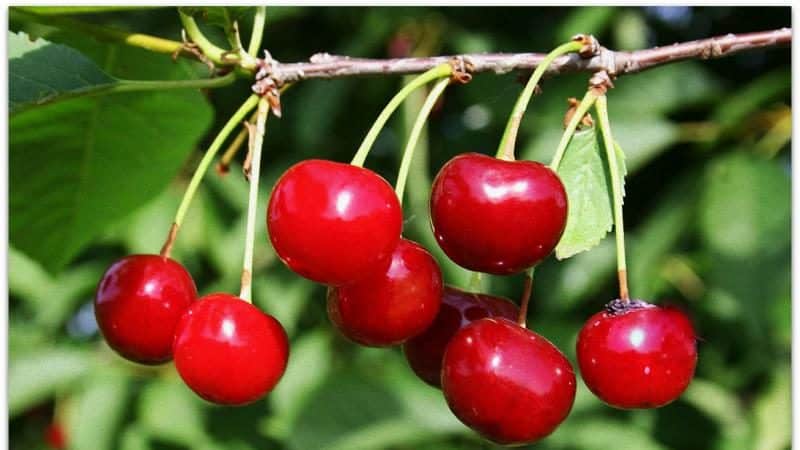
Baby is a dwarf bush variety - the plant reaches a height of no more than 2.5 m. The crown is medium dense, spherical, easy to form. The shoots are strong and powerful, brown in color, the bark is dense. The leaves are pointed, thick, dark green. Thanks to its low bushes, Malyshka is suitable for planting in compact garden plots - unlike tall and dense plants, it does not take up much space. The small size of the tree makes it easier to care for and harvest.
The color of the fruit is rich red, the peel is shiny, glossy. The weight of the berry is about 6 g, the pulp is dense and juicy. The taste is refreshing, sweet and sour. The stone is large and easily separated from the pulp.Thanks to the dense peel, the fruits are suitable for transportation over long distances and are distinguished by their keeping quality. Cherries are used fresh or for making jam, compote, and juice.
Interesting! To stock up on healthy and tasty berries for the winter, housewives freeze part of the harvest. The cherries are washed under cool water, the pit is separated from the pulp, the berries are dried and placed in a sealed freezer bag or plastic container. Place in the freezer and take out as needed.
Frost resistance and drought resistance
Malyshka cherries are planted in the Saratov, Sverdlovsk, Orenburg, Samara, and Voronezh regions. The variety can withstand temperatures down to -20°C, which distinguishes it from most southern berries. If short frosts occur, Baby will not be harmed.
Drought resistance is average; in the first years, cherries are sensitive to lack of watering. If there is frequent rain in the summer, the fruits will grow larger and juicier. It is important not to miss the first watering of the cherries - it is carried out after flowering and applied immediately feeding.
Variety resistance to diseases and pests
The baby is resistant to a common disease of fruit and berry crops - coccomycosis. Resistance to moniliosis, anthracnose and rust is average. If agricultural practices are followed, insect pests do not bother the bushes. If you do not follow the rules of care, then Baby is affected by aphids, sawflies, and weevils.
This is interesting:
The sweetest cherry varieties for central Russia
What are good cherry-cherry hybrids and what are their features?
Pollinator varieties
The Malyshka variety is self-sterile, so when planting it is important to pay attention to the presence of pollinating varieties. For a flower to become a fruit, its pistil must receive pollen from another variety of cherry or sweet cherry. Suitable pollinators for Malyshka are the varieties Vstrecha, Nochka, Turgenevka, and Igrushka.
Insects such as bees and wasps can also be pollinators. However, they do not fly in cold or wet weather, so it is better to play it safe and plant several other varieties nearby.
Flowering and ripening period, yield
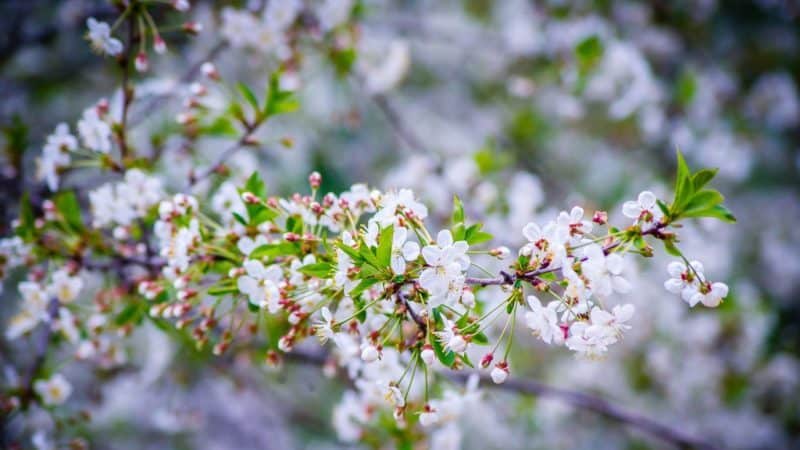
Cherries produce their first harvest in the third or fourth year after planting. The variety is early ripening; gardeners collect berries in mid- or late June, depending on the growing region and climatic conditions. One bush produces up to 15 kg of juicy berries over the summer.
Advantages and disadvantages
The advantages include early ripening, frost resistance, unpretentiousness in planting and growing. The baby is suitable for those who have never encountered planting berries on the plot before. Gardeners value it for its juicy and tasty pulp, which is used for various culinary purposes. The baby is distinguished by its transportability and keeping quality, stable yield. The bushes rarely get sick and take up little space.
Disadvantages of the variety: self-sterility. To get a good harvest, other varieties are planted nearby. Also, after the berries ripen, it is recommended to immediately remove them from the branch - otherwise they will crumble and lose their taste and commercial qualities.
Planting seedlings
For planting, choose an area with light, breathable soil. A place protected from wind and groundwater, such as a hilly area, is suitable. The holes are prepared in the fall, before frosts - the ground is cleaned of debris and plant debris, dug up and treated with a solution of Bordeaux mixture. It is recommended to apply fertilizer - a mixture of compost and superphosphate.They will make the soil more nutritious and suitable for the young plant.
Instructions for planting seedlings of the Malyshka variety
Cherries are planted in early spring, when the snow melts. Seedlings are purchased in advance - their roots must be healthy, without spots or signs of rot. The branches are strong and elastic, without dry areas. The recommended age of the seedling is 2 years, the length of the roots is at least 30 cm.
The landing algorithm is as follows: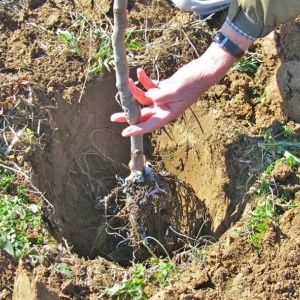
- 14 days before planting, dig a hole with a diameter of 60-70 cm and a depth of 0.5 m. Form a small mound at the bottom and stick a strong peg into the ground.
- Place a seedling in the center of the mound and distribute the roots along the slope.
- Sprinkle with soil on all sides and compact. The root collar should be located above the ground surface at a distance of 5 cm.
- Tie the bush to a peg. Water the plant generously with warm water.
- Sprinkle mulch from sawdust, hay, and leaves.
The distance between the bushes should be at least 2.5 m. Otherwise, the crowns will obscure each other and take away sunlight. This will cause the fruits to ripen slowly, grow small and sour.
Subtleties of further care
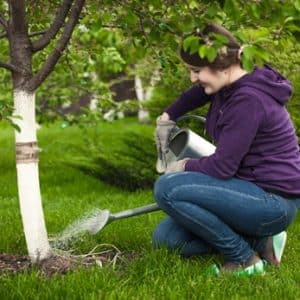
In order for the Baby cherry to produce a good harvest, gardeners follow the rules of care - water the bushes in a timely manner, fertilize the soil, shape and protect from diseases and pests.
Watering intensity
The first watering is carried out immediately after planting using a garden watering can. This method allows you to distribute moisture most rationally. For irrigation, it is recommended to use settled water at room temperature. In dry summers, 2-3 waterings are carried out, in rainy summers - one. The older the cherry, the less moisture it needs. When watering, it is recommended to ensure that the root collar does not get wet.If roots are visible during watering, gardeners sprinkle them with dry soil.
Attention! To keep the water in the hole longer, moisten the cherries in the evening after sunset. The effect of watering increases if you regularly loosen the soil.
Soil fertilization
Organic and mineral fertilizers are used for cherries.. The first group includes manure, compost, and sawdust. Organic fertilizers nourish the soil and provide the plant with vitamins for development. Mineral fertilizers are needed for balanced nutrition of cherries - they saturate the fruits with phosphorus, nitrogen, potassium, and calcium. Minerals improve fruiting and make cherries juicy and sweet. They are contained in urea, potassium salt, superphosphate, ammophosphate.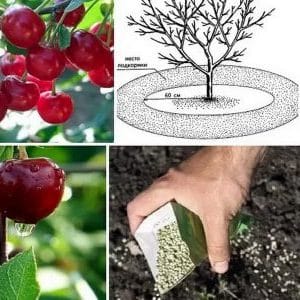
Fertilizers are also divided into:
- root - dry compositions or solutions that are introduced into the tree trunk circle, having previously loosened the soil;
- foliar — spraying for preventive purposes to protect against insects and pests.
The following compositions are suitable for Malyshka cherries:
- for 10 liters of water 20 g of urea before flowering;
- for 50 liters of water 5 liters of mullein and 10 tbsp. ash during flowering;
- per 10 liters of water 15 g of potassium sulfate and 100 g of superphosphate 2 weeks after the previous fertilizer.
How to trim cherry Saratov baby
Cherries are shaped and pruned so that there are more large and healthy berries on the shoots. New shoots are pruned in early spring. It is important to do this before new buds form. Next, remove all dried shoots. Gardeners pay special attention to the formation of the crown - they select the central trunk and cut off all the shoots at a distance of 40 cm from the ground. Subsequent pruning is carried out taking into account how quickly and in which direction the branches grow. They do it in the spring autumn pruning - of necessity.
Some gardeners use bending branches to form. With its help, they accelerate the development of young bushes and the entry into fruiting period. The main branches are deflected from the trunk by 50°, and the small branches are moved to a horizontal position. To do this, use wire or twine.
Disease and pest control
Diseases arise due to a lack or excess of minerals, contaminated soil, and waterlogging. Sometimes fungi and bacteria attack weak seedlings that were not treated with disinfectants before planting.
Let's look at the main cultural diseases:
- Moniliosis (gray rot) easy to recognize by the brown-gray shoots and rapid wilting of the plant. Spots appear on the bark that look like burns. Moniliosis is treated with Bordeaux mixture or the drug "Zineb". If measures are not taken in time, the plant will die.
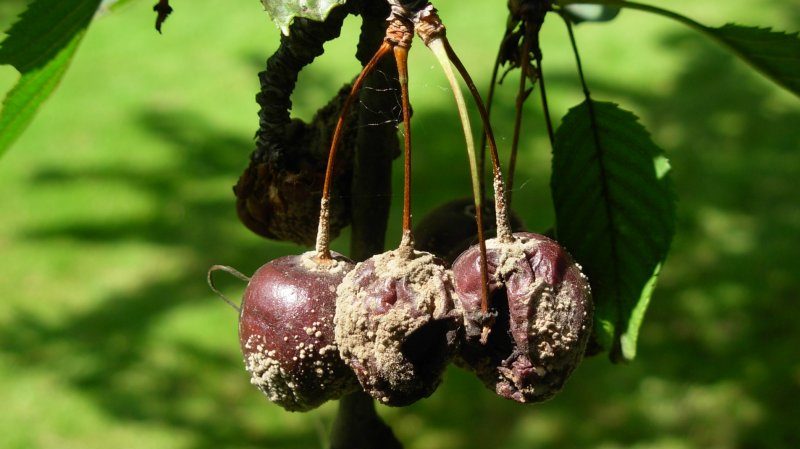
- Rust common among most garden trees and bushes. Orange-red swellings appear on the leaves and shoots. Soon the plant loses its vigor and the fruits do not develop. The drug “HOM” is used for treatment.
- Scab. Brown spots appear on the berries, the leaves curl, and after a few days the fruits fall off. For preventive purposes, seedlings are treated and the soil is dug up before planting. Treated with sprays of Bordeaux mixture.
Among the pests, Malyshka is occasionally affected by sawflies. They appear on cherries in June or July and suck out the juice. The plant withers and the berries fall off. Get rid of sawflies using the drug "Piriton".
Harvest and storage
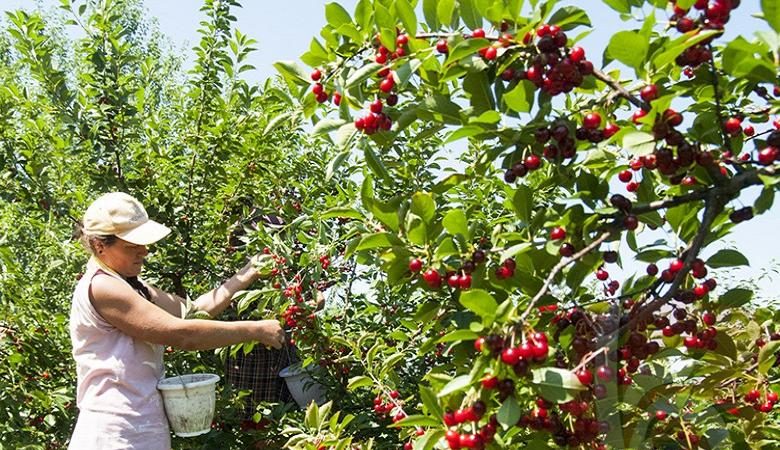
The fruiting period of the Malyshka cherry is extended. Harvesting begins with the appearance of the first ripe berries - the cherry becomes elastic and acquires a rich burgundy-red color.If gardeners want to preserve the berries or transport them over long distances, they pick the fruits two or three days before they are fully ripe. They start collecting in the evening in dry weather to avoid dew and the hot summer sun. Do not pick berries in the rain - the taste will become sour or bland.
Attention! 15-20 days before harvest, stop watering. Otherwise, due to moisture, the skin will begin to crack and the pulp will lose its taste.
For storage, choose healthy berries, without dents or damage. In addition to freezing, some gardeners dry the crop - remove the seeds and wash it, lay it out in the fresh air or in the oven. Dried cherries are placed in a sealed bag and stored in a dark place. Fresh cherries are not stored for long; it is recommended to process the harvest or make jam for the winter.
Reviews from gardeners
We bring to your attention reviews about the Malyshka variety.
Anastasia, Moscow region: “I planted Malyshka 7 years ago, and for 4 years now cherries have been pleasing me with delicious and beautiful berries. Their taste is pleasant, sweet and sour, I like to eat Malyshka immediately after harvesting. It is not a hassle to grow - pruning and shaping are easy. During all this time, the cherry tree never got sick. It’s also good for winter preservation.”
Alexander, Saratov: “I planted the Malyshka variety on the recommendation of a gardener friend. I can't say that I'm delighted with this cherry. The fruits are small, I like Miracle Cherry better. The taste is a C grade, the yield is average. And last year the bushes got rust and half the berries died.”
Conclusion
Cherry Malyshka is a productive early ripening variety. It is frost-resistant and is rarely affected by insect pests.From one bush, up to 15 kg of neat and beautiful berries of a rich red hue are harvested annually. Their flesh is dense and juicy, the taste is sweet and sour. One part of the harvest is frozen, the other is used to make jam or eaten fresh. For stable fruiting, it is recommended to feed the plantings with organic and mineral fertilizers 2-3 times per season. Also, once a summer, gardeners form a crown and trim off excess shoots.